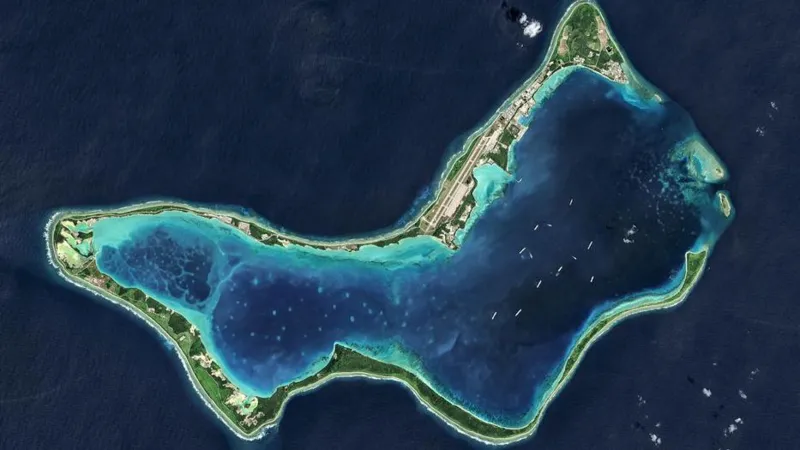Chagos Islands Question
The Chagos Islands, situated in the focal Indian Sea, contain a gathering of north of sixty little islands and are generally prominently home to Diego Garcia, which has a huge U.S. army installation. These domains are of vital worth because of their geographic situating, which gives a pivotal military station in a district set apart by international pressures. The argument about the Chagos Islands essentially includes the Assembled Realm and Mauritius, with attaches following back to the provincial time.
By and large, the islands were important for Mauritius, which acquired autonomy from English frontier rule in 1968. Nonetheless, during this decolonization cycle, the UK isolated the Chagos Islands from Mauritius in a dubious move. This detachment brought up issues in regards to the privileges of the Chagossians, the native individuals of the islands. During the 1960s and 1970s, the English government effectively got rid of almost 2,000 Chagossians from their country, migrating them to the Seychelles and the UK. This occasion not just cut off their connections to their familial land yet additionally ignited continuous lawful and political debates with respect to one side to return.
The foundation of the U.S. army installation on Diego Garcia in the mid 1970s further muddled the circumstance. The base plays had an essential impact in U.S. military activities across the district, making the islands decisively significant to the Unified Realm and the US. Throughout the long term, different fights in court have arisen, with global courts tending to the privileges of the Chagossians and the lawfulness of the UK’s continuous power over the islands. The debates have serious areas of strength for evoked, causing to notice issues of expansionism, self-assurance, and common liberties, subsequently turning into a point of convergence for conversations on regional power.
UK’s Choice: Ramifications and Responses
The new choice of the Unified Realm to surrender power over the Chagos Islands to Mauritius denotes a huge change in the international scene of the Indian Sea. This improvement has broad ramifications, especially for the uprooted Chagossians, who have long looked for the option to get back to their country subsequent to being effectively gotten rid of during the 1960s and 1970s. The affirmation of Mauritius’ power isn’t only a legitimate or strategic move; it addresses an essential step towards tending to verifiable complaints and redressing treacheries looked by the Chagossian public.
Strategically, this move can be seen as an endeavor by the UK to support its global standing and keep up with its relations inside the Republic. By moving control, the UK might expect to fix its picture, particularly considering expanding examination from basic freedoms associations and previous pilgrim domains. The Mauritian government’s reaction has been predominantly certain, featuring the significance of public sway and the reclamation of freedoms to the Chagossians. Authorities in Mauritius have communicated positive thinking that this choice will prompt the bringing home and resettlement of the Chagossian populace, encouraging their social and social reintegration.
Alternately, the UK’s choice has not gone unchallenged. Different partners have communicated blended responses. The UK government faces analysis from common liberties associations that view the cession as a late affirmation of verifiable wrongs. Chagossians themselves have shared a scope of feelings; while many invite the chance of getting back, there is likewise distrust in regards to the UK’s obligation to guaranteeing a smooth and simply change. These responses underline the intricacy of the circumstance and the alternate points of view that entwine in this notable difference in sway.
Future Possibilities for the Chagos Islands
The fate of the Chagos Islands, following the expected change in sway from the Unified Realm to Mauritius, holds huge ramifications for the occupants, the climate, and the complexities of worldwide relations. One of the most squeezing contemplations is the possible return of the Chagossians to their country. Subsequent to being effectively gotten rid of during the 1960s and 1970s, the relatives of the first occupants are looking for equity and the option to return. This cycle might require extensive strategy structures to work with resettlement, give admittance to assets, and guarantee that the social legacy of the Chagossians is protected.
Natural contemplations will assume a pivotal part in the administration of the islands. The Chagos Archipelago is home to rich biodiversity and one of a kind biological systems. Any turn of events – whether focused on the travel industry, preservation, or framework – should be painstakingly figured out how to safeguard these sensitive conditions. Feasible practices will be fundamental for guaranteeing that the islands’ regular magnificence and environmental uprightness stay in one piece while as yet considering financial development.
As far as administration, Mauritius should lay out compelling authoritative systems to address the necessities and freedoms of the Chagossian populace and deal with the islands’ assets. Laying out a legitimate and administrative climate that regards both neighborhood and worldwide regulations will be crucial to help stable administration.
Monetarily, the Chagos Islands present open doors for Mauritius, especially in regions like practical the travel industry, marine examination, and eco-accommodating assembling drives. In any case, the outcome of these endeavors will rely upon coordinated effort between Mauritius, the UK, and worldwide partners, guaranteeing that the prosperity of the Chagossians and natural honesty are focused on. The change of sway will shape the actual scene of the islands as well as the more extensive international elements in the Indian Sea.
Decision: Another Time for the Chagos Islands
The progress of the Chagos Islands from English organization to Mauritian power denotes a critical crossroads in both nearby and global settings. Generally portrayed by provincial abuse, the islands have been the subject of drawn out fights in court and common liberties conversations. The new affirmation of Mauritius’ case restores the islands as a feature of its regional honesty, lining up with the yearnings of the Chagossians who were effectively dislodged in the last part of the 1960s and mid 1970s. This progress not just reestablishes a feeling of character and having a place for the native populace, however it likewise builds up their freedoms under worldwide regulation.
This shift connotes something other than an adjustment of power; it addresses a more extensive retribution with frontier heritages that endure in the cutting edge period. The choice underlines the global local area’s position on decolonization, especially the privileges of countries to recover sovereign domains shamefully took from them during frontier rule. Besides, it fills in as a powerful sign of the continuous battles looked by dislodged people groups worldwide. The situation of the Chagossians has drawn global consideration, highlighting issues of repayments and equity for networks impacted by expansionism.
As the Chagos Islands enter this new period under Mauritian administration, it imagines a future that tends to verifiable treacheries and encourages significant exchange about recovery and reparative measures. While challenges remain, especially with respect to the foundation of a feasible presence for the Chagossians, this progress proclaims a chance for compromise and development. The instance of the Chagos Islands builds up the meaning of propelling self-assurance and value on the global stage, eventually preparing for an additional equitable and comprehensive world.

